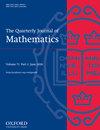贝塞尔算子生成的泊松半群微分变换的有界性
IF 0.5
4区 数学
Q3 MATHEMATICS
引用次数: 0
摘要
本文将分析以下数列的收敛性:$$ T_N \,\,f(x)=\sum_{j=N_1}^{N_2} v_j\Big({\mathcal P}_{a_{j+1}})\f(x)-{mathcal P}_{a_{j}}\,\,f(x)\Big),\quad x\in \mathbb R_+, $$ 其中 $\{\mathcal P}_{t}\是与贝塞尔算子 $\displaystyle \Delta_\lambda:=-{d^2\over dx^2}-{2\lambda\over x}{d\over dx}$,λ是一个正常数,$N=(N_1, N_2)\in \mathbb Z^2$,其中$N_1 \lt N_2、$\{v_j\}_{j\in \mathbb Z}$ 是有界实数序列,$\{a_j\}_{j\in \mathbb Z}$ 是递增实数序列。我们的分析将包括算子 TN 及其最大算子 $\displaystyle T^*\,\,f(x)= \sup_N \left\vert T_N \,\,f(x)\right\vert的有界性、$L^p(\mathbb{R}_+)$ 和 $BMO(\mathbb{R}_+)$。还证明了最大微分变换算子的局部大小与具有局部支持的函数 f 的奇异积分的阶数相同。本文章由计算机程序翻译,如有差异,请以英文原文为准。
Boundedness of Differential Transforms for Poisson Semigroups Generated by Bessel Operators
In this paper we analyze the convergence of the following type of series: $$ T_N \,\,f(x)=\sum_{j=N_1}^{N_2} v_j\Big({\mathcal P}_{a_{j+1}} \,\,f(x)-{\mathcal P}_{a_{j}} \,\,f(x)\Big),\quad x\in \mathbb R_+, $$ where $\{{\mathcal P}_{t} \}_{t\gt0}$ is the Poisson semigroup associated with the Bessel operator $\displaystyle \Delta_\lambda:=-{d^2\over dx^2}-{2\lambda\over x}{d\over dx}$, with λ being a positive constant, $N=(N_1, N_2)\in \mathbb Z^2$ with $N_1 \lt N_2,$ $\{v_j\}_{j\in \mathbb Z}$ is a bounded real sequence and $\{a_j\}_{j\in \mathbb Z}$ is an increasing real sequence. Our analysis will consist in the boundedness, in $L^p(\mathbb{R}_+)$ and in $BMO(\mathbb{R}_+)$, of the operators TN and its maximal operator $\displaystyle T^*\,\,f(x)= \sup_N \left\vert T_N \,\,f(x)\right\vert.$ It is also shown that the local size of the maximal differential transform operators is the same with the order of a singular integral for functions f having local support.
求助全文
通过发布文献求助,成功后即可免费获取论文全文。
去求助
来源期刊
CiteScore
1.30
自引率
0.00%
发文量
36
审稿时长
6-12 weeks
期刊介绍:
The Quarterly Journal of Mathematics publishes original contributions to pure mathematics. All major areas of pure mathematics are represented on the editorial board.

 求助内容:
求助内容: 应助结果提醒方式:
应助结果提醒方式:


